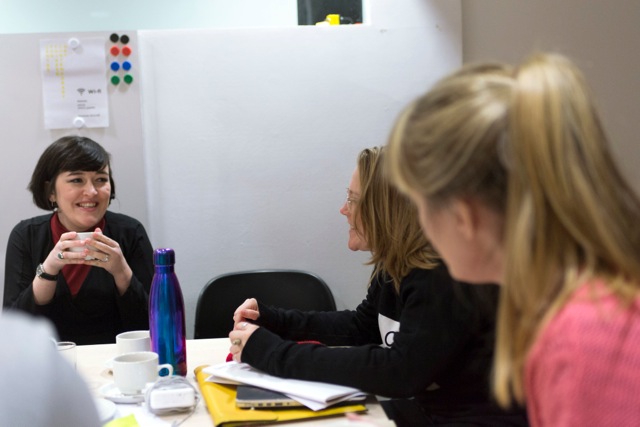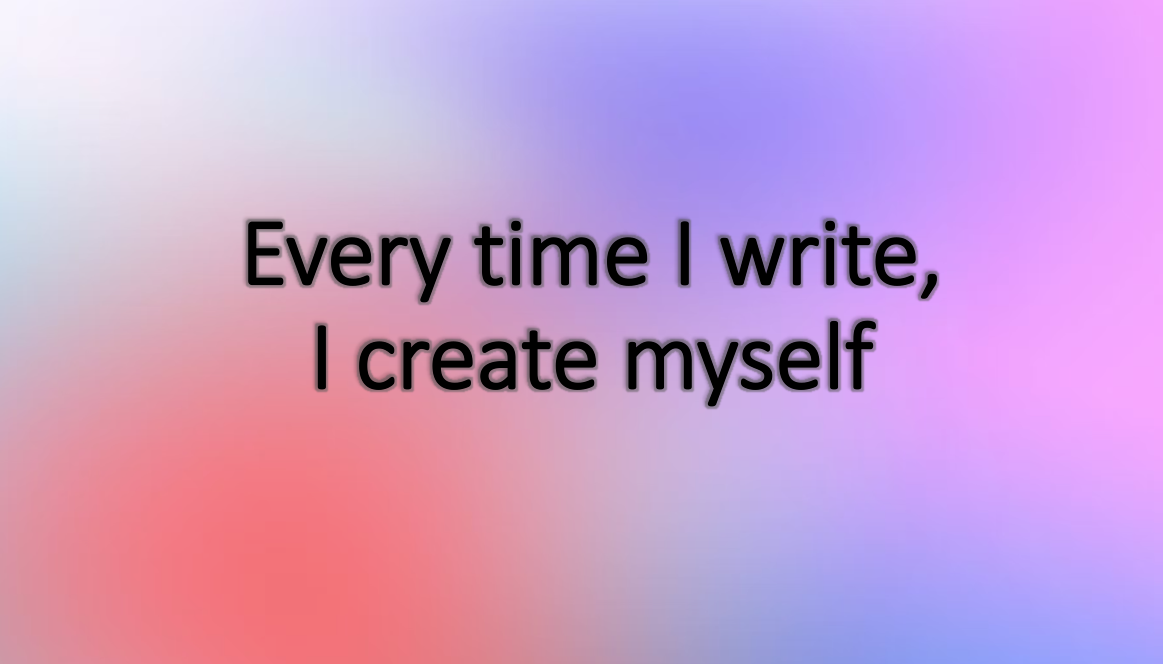Testimonials: teaching

I’ve been teaching in different capacities across Europe (with young people and adults, at galleries, studios, charities, universities, festivals, schools and colleges) since 2008. It is my pleasure to teach people from all backgrounds with a ‘kindness first’ approach. Creative play is very important.
Quite often I work with people who have been told that they ‘can’t write’; those who struggle with Dyslexia, Autism, ADHD; and those who are traumatised from poor school experiences. It is my aim to break down some of these real barriers and crippling fears with practical tools, and to re-introduce my students to writing in ways that boost lasting confidence, satisfaction, and delight in the form.
I see every day, in every class, how writing can give voice to the things that matter most, and in what ways writing can evolve/energise an arts practice.
Please do get in touch if you’d like to discuss a class.
See my CV (click here) for a taste of where I’ve taught.
Student testimonials
For her passion, knowledge and enthusiasm for the subject, Laura is this year’s winner of the Outstanding Lecturer Award, School of the Arts (2023-24), awarded by and for the students of University of Bolton Student Union. She currently teaches criticism, theory, history and writing for BA (Hons) Photography.
Laura goes above and beyond. She embraces those with additional needs. She is inspirational and has a natural passion for the role.
First year BA Photography students, Pre, Present, Post Photography module (99% overall satisfaction score):
Out of all the modules this semester I feel like this is the one I got the most out of, it brought me out of my shell, made me feel more comfortable speaking in front of the class. The tutor gave me excellent guidance and was always there whenever I was putting too much pressure on myself. She helped me believe in myself again and fall back in love with writing.
This was my favourite part of semester one. I was able to get academically challenged with the writing. I enjoyed the research and learning how to reference properly.
I really enjoy Laura’s teaching methods. She brings a lot of energy to the course - especially when the topic is heavy and harder to digest.
I particularly like Laura's energy - even with the most difficult lectures she made it fun and interesting, and without her it would just not be the same. I have learned a lot and it's been surprising how, without realising it, how we can use what we've learned in other modules. She is a credit to the university.
A workshop on writing artist statements (StudioBook, Mark Devereux Projects):
Excellent session, Laura was brilliant, warm and energetic. Really well-paced session that included practical exercises. I came away feeling enthused about writing rather than seeing it as a necessary evil. Great examples really helped.
Infectious, full of enthusiasm and hugely encouraging. Approachable and made the information accessible. Delivered with humour and personality.
Super charismatic speaker. She had so much energy and left the group so excited and energised. It was great to gear so many tips and techniques from an expert.
A workshop devised for artists: playing with the written ‘voice’ (SHIFT Programme, Finnish Art Agency):
The way you approach writing and storytelling felt like breath of fresh air to me. It really encouraged me to use words and writing more creatively and to do it with my own personal but honest way. I'm rejuvenated.A workshop for photographers: using writing to shape your practice (Lightbox Programme, Redeye Network)
It was superb! I think you gave us more space to hear our own voice... Today your words convinced me once again that I have to write down my thoughts and work with these insecurities. I love to write but there is a challenge still.
I always love listening to you and last night was wonderful – thank you so much! You somehow make things seem possible and the world a bit brighter. Very inspiring.
I just wanted to say thank you for your talk last night, it was super helpful, especially the breakout room and you calling me out towards the end. Although I’m thoroughly enjoying Lightbox I’m very much an introvert, and I’ve sat on the edge of the main group for most of the sessions, but your task has given me loads of confidence.
You were bloody great tonight and I reckon I’m not the only one thinking that.

A review of my workshop: ‘Every time I write, I create myself’
By Alex Markwith
In June I had the pleasure of being a Zoom participant in a creative writing workshop with Laura Robertson of The Double Negative, hosted by the Finnish Art Agency in Helsinki. It was a highly engaging two hours during which we explored different approaches to creative writing and reconsidered the ways we write about our artistic work.
The workshop is structured around several five-minute writing exercises, which Robertson says are “deliberately fast-paced in order to outrun anxiety and self-doubt while opening up a space to write instinctively”. Sounds like exactly what I need, and I think I am not alone in that sentiment.
The first, and for many, most difficult, hurdle of the creative process is to give yourself permission to start, without prejudging your own thoughts. Robertson begins by emphasizing that our time together is about “creative play” rather than perfection or editing. She encourages us to “banish our inner critics” and allow our writing to “have an infancy”. Our focus today is generating text without over-analyzing, allowing ourselves the freedom to produce.
Our first writing exercise is to look out the window and describe what we see. Five minutes goes by quickly, after which we are given the option to share our writing with our Zoom group and discuss the experience. It is amazing how much the simple exercise has warmed up our mental muscles, gotten our juices flowing.
Laura Robertson strikes a remarkable balance between giving us time as participants to engage in the active practice of writing, and contextualizing the methodology of her workshop with a slide presentation displaying relevant images and quotes, often but not always from familiar names. “Every story I create, creates me. I write to create myself.” That quote from Octavia E. Butler is one of many gems.
A later exercise focuses on the subjective voice, using the first-person pronouns: I, me and my. Looking back, this seems quite logical. If “I” am writing, then of course I have to talk about me!
Yet, this exercise felt oddly subversive because as I recall now, writing in the first person was something that, at least for some time during my public school years in the United States, I was explicitly taught not to do. As a teenager, I was taught that one must aspire to objectivity in one’s tone, and thus write in the third person. Remove yourself as an author; talk about the facts. No doubt that approach is well suited for certain types of writing, such as a scientific journal or academic research paper, but for an artist it’s just another rule to throw out the window if you wish. Maybe writing about your work in the first person is exactly what you need to open up.
As evidence, Robertson presents a 1961 text titled “I am for an Art”, an artist statement written by Claes Oldenburg in which every sentence begins with the words “I am for”. It is inspiring to read, and becomes the basis of our next exercise.
Many artists struggle to write about their own work, a curious reality we set out to untangle in our discussion. As a painter, I confirm that it is often difficult to translate my visual art practice into words. Writing about my work presents a challenge as per the truism that artists tend to be the worst people to explain their own creations. Plus, it’s important to note that when we write about our work as artists, it is often done alongside grant or exhibition applications which demand their blocky fields be filled according to specific criteria. The reward is in the distance, and I am about to submit my material into a pool of untold numbers. I need to present myself as the most qualified professional, check all the boxes, get the facts straight. No room for error! Writing under pressure, it tends not to occur that maybe I should try to access the same creative mindset that I find when painting. It again feels subversive in some way, as though creativity belongs in the studio whereas when I am writing about my work I am reporting for business, presenting a different side of myself to the public.
Instead, Robertson asks: Would a more creative writing approach reflect your work better? Why are we taught in art school to keep our writing separate from our studio practice? Can your artist statement be more experimental?
Robertson proposes that art writing as a whole would benefit from being less academic, and suggests several methods for us to generate more creative text.
For example, you could try writing in the voice of your own favorite artist or author. You could write from the perspective of an animal. You can write from the perspective of a non-living object, including but not limited to one of your own artworks. How about writing from the perspective of a color?
If that type of thing is too “out there” for your taste, no problem. Take a few deep breaths and describe the sounds of your surroundings, without using metaphor or simile. You could also try to create an inventory of items in your home: look around and list every item you see, then categorize.
Of course, these are only a few of the endless ways to overcome the dreaded “writer’s block”. It must be said, but it should go without saying that you can always invent your own exercises. As Laura Robertson says, “We can write any way we want.”
Alex Markwith, 2023.
Image courtesy Redeye Network, 2019.
Contact Laura Robertson
Based in Liverpool, UK, with easy access to airport and train services. Free to travel.
To discuss hiring me (commissions, guest lectures/workshops, mentoring, visiting studios, etc.), do get in touch. I’m happy to discuss approaches, rates and availability:
︎︎︎ laura[at]thedoublenegative[dot]co[dot]uk
︎ +44(0)7854697434
Read my indie arts and culture magazine, co-founded with arts writer Mike Pinnington in 2011:
︎︎︎ www.thedoublenegative.co.uk
Tweet tweet:
︎︎︎ @doublenegativeL
TikTok:
︎︎︎ @art_critic_laura
Buy me a coffee ☕️️ :
︎︎︎ www.buymeacoffee.com/laurarobbo